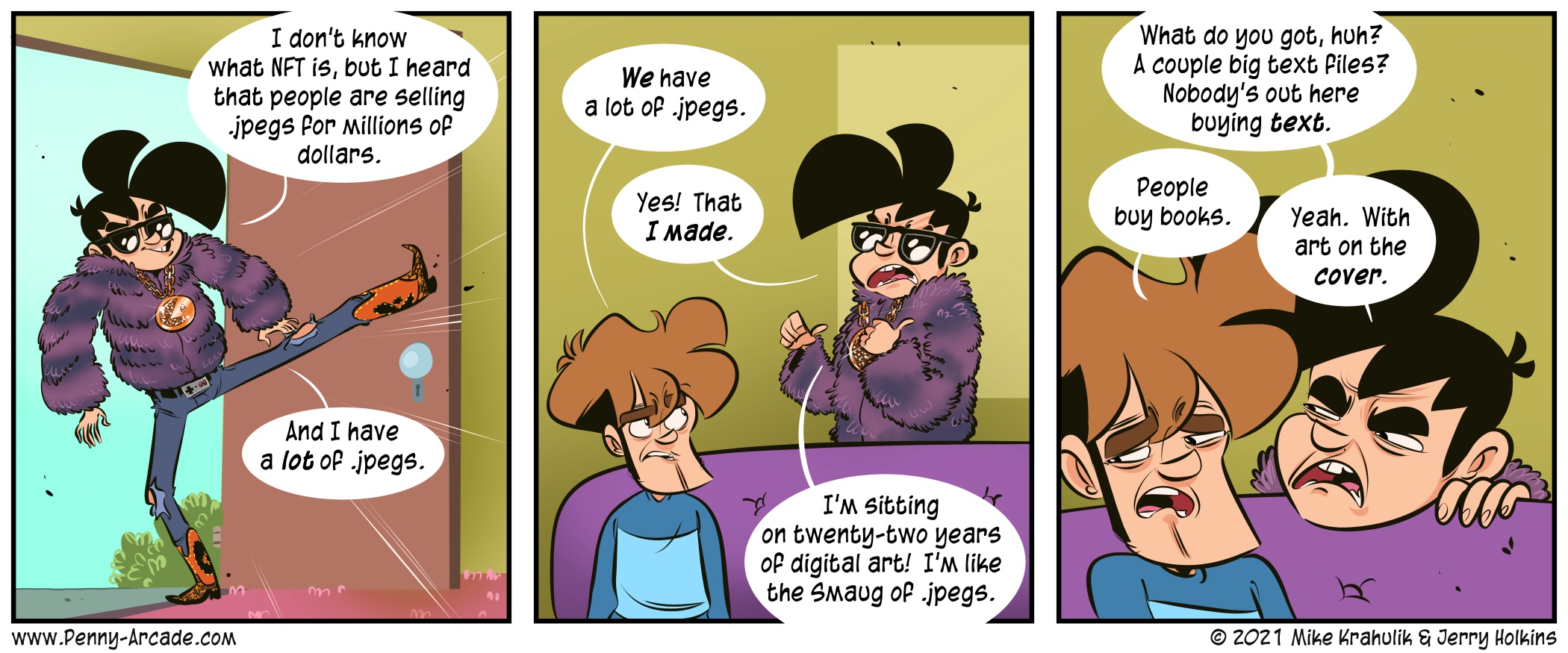Open call for Board Member and Moderator positions in Coin Return. More information here.
Sign up to win MNC Dover's voice! Details here.
Penny Arcade - Comic - New-Fangled
Dog Registered User, Administrator, Vanilla Staff admin
Registered User, Administrator, Vanilla Staff admin
 Registered User, Administrator, Vanilla Staff admin
Registered User, Administrator, Vanilla Staff admin
 Penny Arcade - Comic - New-Fangled
Penny Arcade - Comic - New-Fangled
Videogaming-related online strip by Mike Krahulik and Jerry Holkins. Includes news and commentary.
Unknown User on
+16
Posts
That entire outfit
It's the same mindset. The technology is moving so fast, people are trying to move fast with it in the hopes of being able to buy low and cash out before it all collapse. Or at least hedge their bets by investing in the digital, then transferring some of that wealth back into stable financial instruments, so that they win either way.
There's also the ethical problem where allegedly a single cryptoart trade outputs 100 kg of carbon dioxide from the sheer amount of computing power required? Sheesh.
That's going to depend on which chain is backing it, but given right now it's either bitcoin or ether, yes. You don't want to know how much energy it costs.
edit: Example: A single transaction on ether, the chain that is almost certainly backing all this at the moment, consumes 744kWh, almost an entire months worth of a household. I could charge my car completely empty-to-full 12 times.
That's super interesting, and something I never knew about or even consider when it comes to cryptocurrency.
I'd also add that you can fake a digital image if a high-resolution copy exists somewhere. Sure, you can say that you have the original file, but is that really meaningful?
I mean, you can make a forgery or copy of a masterwork piece of art, but it's still the copy. There's something to be said about physically interacting with a piece that a genius human being touched and created. There's a physical connection that, in my mind, is more powerful that saying that the digital artist created it on a computer, then clicked "save as" and emailed you an encrypted file.
Adam Ruins Everything explained how it works with paintings very well: this looks like the exact same thing to me.
(I do think that's the mindset of the non-millionaires involved - the millionaires, as always, have access to a bunch of tricks no one else does)
At a certain level, even having the original file isn't meaningful, just due to the way that digital file storage works in modern operating systems. When you "move" a file within a single drive, you're just moving its pointer and leaving the file where it is, but the operating system will move files physical location on the drive as a normal function of space management, which physically involves making a brand new copy and aiming the pointer to that instead of the original.
But if you move a file to a new drive or transmit it on the internet, you're also just making a brand new copy. Your computer doesn't even delete the original, it just forgets where it is. It's the Ship of Theseus except the original timbers didn't rot, you just threw away the key to the museum door after meticulously building an absolutely identical museum and ship next door.
A very nice description of how much work it is to commodify something that's virtually infinitely reproducible.
Also we're probably only a year or two out from AI upscaling being able to produce a better version of your JPG on demand at the consumer level.
This aspect confuses me somewhat. How exactly does sending a transaction through bitcoin use more energy than say, sending someone money through something like Paypal? Aren't they essentially doing the same thing, sending data from one account to another to tell it how much money to add/subtract?
No, they have to do a bunch of extra cryptographic stuff. It's what makes blockchain what it is.
The currency isn't backed by anything. If I give you a twenty dollar bill, there's something behind it and verifying it's a 20 dollar bill. When I give you a cryptocurrency you have to verify it's real, which takes a bunch of computer stuff, which eats electricity